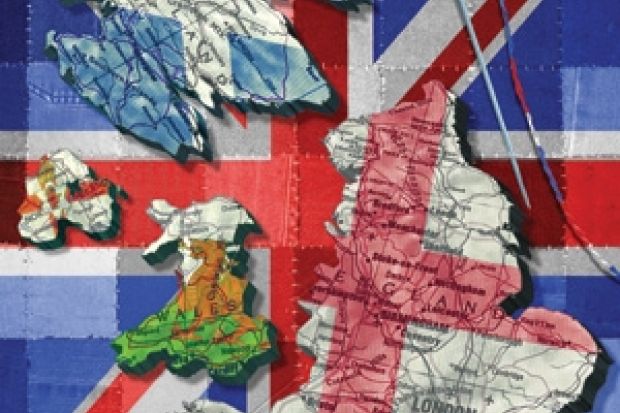Not so very long ago, there was a clearly "British" model of higher education and a "British" conception of the university. Despite Scotland's four-year degrees, this model applied across the UK. From the 1990s it became highly marketable internationally - even as higher education changed domestically, with widening participation and the increasing use of tuition fees to help fund growth. But as demonstrated by Universities and Constitutional Change in the UK, the recent Higher Education Policy Institute report on devolution, the UK sector now faces a significant set of challenges that are territorial in nature.
While devolved governments in Scotland, Wales and Northern Ireland each pursue distinct policies, the differences are clearest between England on the one hand and the three devolved governments on the other. The drastic cuts to the teaching grant in England from 2012-13, particularly for the humanities and social sciences, and the move to relying on fee income are just part of a major shift. The policy of conferring degree-awarding powers on commercial profit-seeking institutions is part of the same policy direction. The "English" degree and university are becoming increasingly divergent from those found elsewhere in the UK: market-oriented and treated as commodities to be paid for principally by the student, rather than public goods partly paid for by the public purse.
This vision is emphatically not shared by the devolved governments. They continue to embrace a wider role for higher education, seeing it as a way of shaping social mobility and economic development as well as serving the existing economy. The effectiveness with which the devolved governments have implemented their policies may be questionable - their record on improving participation could kindly be described as "patchy", for example. However, it is clear that their approach to higher education is fundamentally different from England's. Devolution has enabled devolved governments to stay with the old while England ploughs on with the new.
No one should be surprised that a set of constitutional changes designed to promote different approaches to public policy has resulted in just that. For all the talk about "British" higher education, this now survives in name more than substance. The UK has four, increasingly distinct higher education systems, not one with modest variations.
At the same time, English policy continues to exercise a powerful influence on devolved governments. Marketisation risks devaluing the currency of the "British" degree. Cutting teaching grants and shifting the burden of funding to fees has an effect on the block grants calculated under the Barnett formula; the aggregate funds available to the Scottish and Welsh governments and the Northern Ireland Executive are reduced as a result, forcing them to make hard choices about how generously to fund the sector, and where to find the money to do so. This is difficult enough for relatively well-funded Scotland, but much tougher for Wales and Northern Ireland.
Research funding is a non-devolved matter, from which Scotland continues to get more than its population share but Wales and Northern Ireland do not. Decisions about it are shaped foremost by English priorities and policy goals, with little high-level engagement from the other three governments to shape policy.
There is even less discussion about what a "degree" is; that is standardised largely through the Bologna Process and the role of external examiners, not by a more deliberate approach.
Given the different policy trajectories pursued by the four governments, the lack of any overarching policy structure and the way English policy can affect the devolved administrations, it is a surprise that there have not been serious problems sooner. Students, parents and citizens now see a confusing patchwork from which there is an almost random pattern of winners and losers; governments see particular specific problems, to which they respond on an ad hoc basis. All this is a recipe for increasing political problems. The ride has already been bumpy for some, but is likely to get much rougher in the years to come.
Register to continue
Why register?
- Registration is free and only takes a moment
- Once registered, you can read 3 articles a month
- Sign up for our newsletter
Subscribe
Or subscribe for unlimited access to:
- Unlimited access to news, views, insights & reviews
- Digital editions
- Digital access to THE’s university and college rankings analysis
Already registered or a current subscriber? Login
